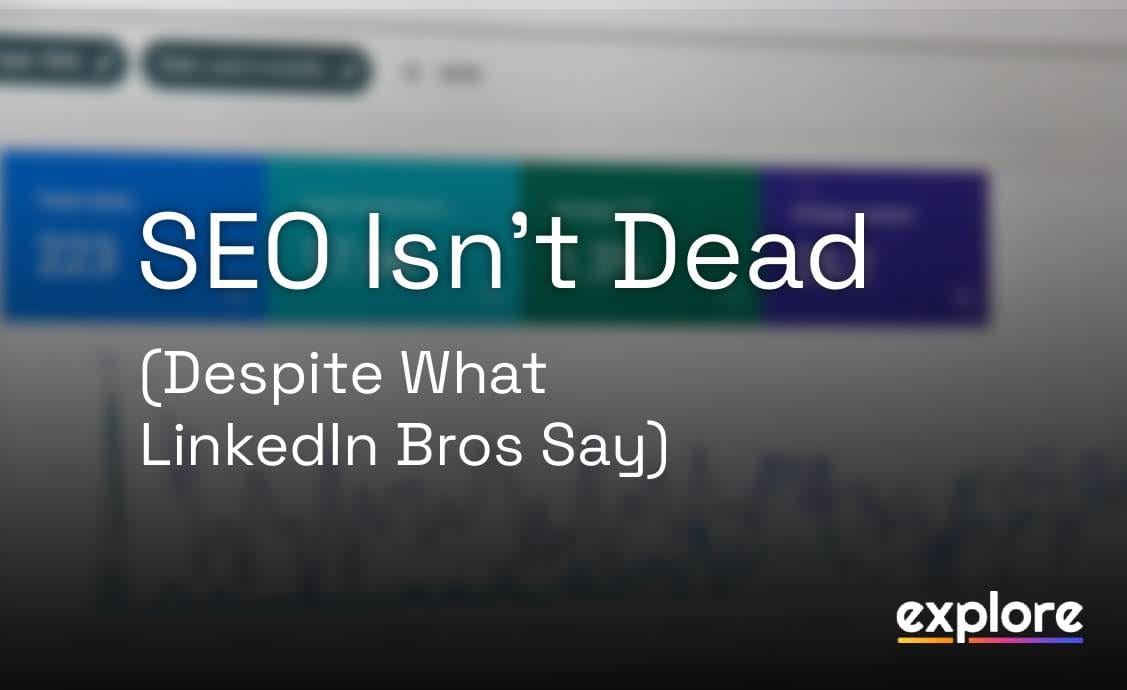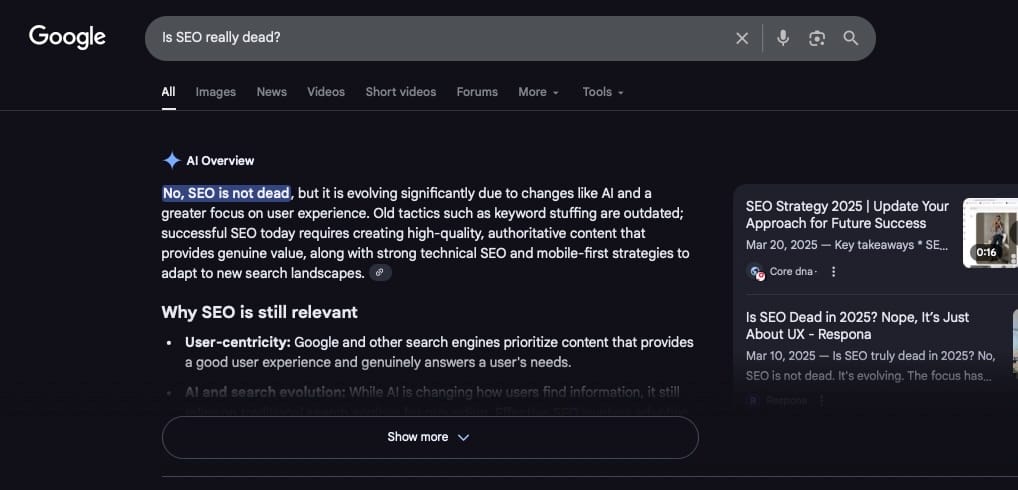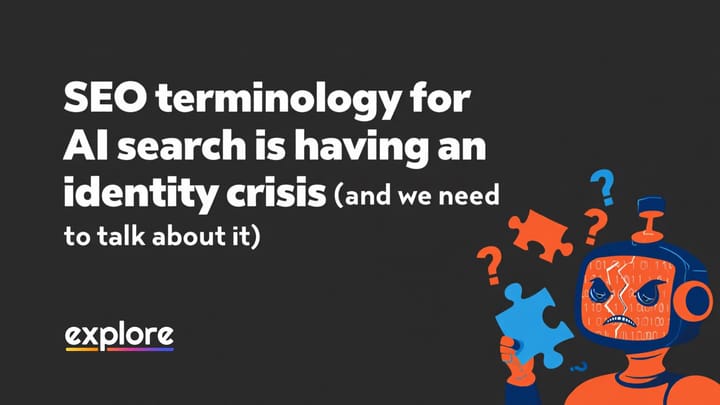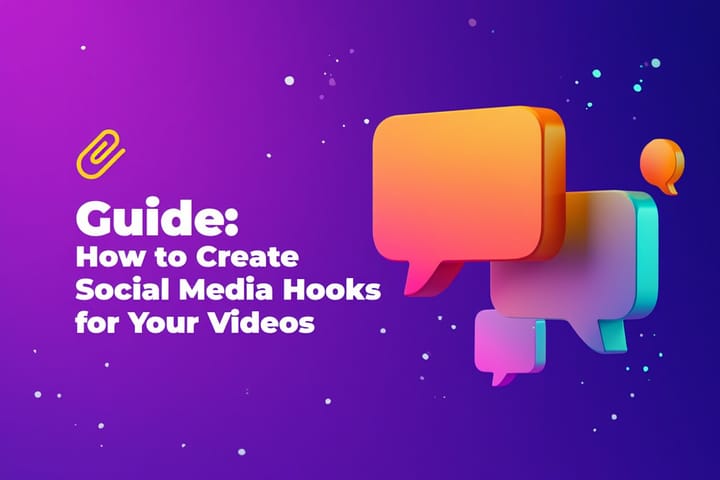SEO isn't dead — it's evolving faster than ever
SEO is not dying, it's thriving with unprecedented growth... but the game has fundamentally changed.

I've been doing SEO almost every single day for over 15 years now. During that time, I've been told a thousand times that "SEO is dead", and each time for different reasons. The reality? You wish. It's a channel that works just as well as ever, still delivering high conversions and exceptional ROI. If it were really dead, I wouldn't be wasting my time writing this article and you certainly wouldn't be reading it.
Google maintains overwhelming dominance with 93% market share and processes 373 times more searches than ChatGPT, while businesses are increasing SEO budgets at record rates. However, success now requires optimizing for both traditional search engines and emerging AI platforms, a practice called Generative Engine Optimization (GEO). The winners in 2025-2026 will be those who combine comprehensive topic authority, genuine expertise, and multi-platform visibility rather than the old game of simply chasing keywords.
The panic around ChatGPT "killing" Google search has created more noise than truth. While AI is reshaping how people find information, organic search remains the dominant traffic source, delivering 53% of all website traffic and generating $22 return for every dollar invested. Here's what the data actually shows about the future of search, SEO performance, and how to adapt your strategy for the AI era.
Google vs ChatGPT: the traffic reality check
Despite explosive growth for AI chatbots, Google's dominance remains virtually unchallenged. Google processes over 5 trillion searches annually (approximately 14 billion searches per day) and maintains 89-93% global search market share depending on measurement methodology. In contrast, ChatGPT handles roughly 37.5 million search-like queries daily (even if it's keep increasing - and it is), representing just 0.25% of the search market.
ChatGPT's growth trajectory is undeniably impressive, scaling from 100 million weekly users in November 2023 to 800 million by September 2025, with monthly visits reaching 5.7 billion. However, only 30% of ChatGPT prompts qualify as traditional search-like behavior. The remaining 70% involves tasks like coding assistance, content creation, brainstorming, and creative work (fundamentally very different from search intent).
These platforms serve as complementary rather than competing: Google for discovery and navigation, ChatGPT for task completion and creative assistance.

The SEO industry is thriving, not dying (even if people are telling you the opposite on LinkedIn)
Every major market research firm projects robust growth for the SEO industry through 2030. Grand View Research forecasts the market expanding from $74.6 billion in 2024 to $154.6 billion by 2030 at a 13.5% annual rate. Mordor Intelligence projects similar growth from $74.9 billion to $127.3 billion, while Verified Market Research offers the most aggressive estimate of $380.2 billion by 2032.
The most telling indicator comes from actual business behavior: 82.5% of marketers increased their SEO budgets in 2024 (and spoiler: we did it too as marketers - for two consecutive years), with 88% planning to maintain or increase investment in 2025.
This increased investment is justified by strong returns. SEO delivers an average ROI really high compare to any other channel. Of course, 49% of marketers identify organic search as offering the best ROI among all digital marketing channels, and 70% confirm SEO generates more sales than PPC (but it makes sense as people are looking for your products directly - and you're not just trying to target them with your ads).
Organic search is still HUGE. Yep. Did you know that's it's actually 53% of all website traffic? More than three times the share of paid search at 15%. For B2B companies specifically, organic search generates 44.6% of all revenue and drives 79% of customer acquisition campaigns.
So let's be clear: These aren't the statistics of a dying channel; they represent a mature, essential marketing discipline experiencing renewed growth as businesses recognize its sustained value. But yes: SEO takes time, a lot of resources and a range of people to be involved from devs to marketers.
AI content: challenge and opportunity
Google's March 2024 core update represented the biggest algorithmic shift in SEO history, reducing low-quality content by 45%. The update specifically targeted AI-generated spam, with a lot of websites receiving manual penalties and in some cases even complete de-indexing. Some websites publishing high-quality, non-AI content have also been affected sadly, but Google is increasingly trying to address this issue.
Today we released the August 2025 spam update.
— Google Search Central (@googlesearchc) August 26, 2025
It may take a few weeks to complete, and we'll post on the Google Search Status Dashboard when the rollout is done:https://t.co/VyY24LVujq
Google is releasing new updates to fight against AI and spam, currently almost every month.
However, Google's official stance is nuanced: AI content is not automatically penalized. Google's guidance states that:
"appropriate use of AI or automation is not against our guidelines" and focuses on "rewarding high-quality content"
The January 2025 Quality Rater Guidelines explicitly address this, noting that content where "all or almost all" main content is AI-generated with "little to no originality" receives the "Lowest" rating.
The pattern from successful implementations is clear: the hybrid approach wins -almost- consistently.
AI content succeeds when paired with original insights, proprietary data, first-hand experience, and expert review. It fails when used for mass production without human oversight, when it simply regurgitates existing information, or when it lacks demonstrated expertise. Think about it - if you wouldn't read it, why would anyone else?
The March 2024 update also introduced new spam policies targeting mass-produced content with minimal effort or originality, regardless of whether it's AI or human-generated. This shift refocuses SEO on what Google calls "people-first content" rather than "search-first content," with E-E-A-T (Experience, Expertise, Authoritativeness, Trustworthiness) signals becoming more important than ever.
The rise of Generative Engine Optimization (GEO)
A new discipline called Generative Engine Optimization emerged in the last few years when researchers published the first academic paper on optimizing content for AI-generated answers. GEO represents a fundamental shift from "ranking for clicks" to "earning citations and mentions" in AI-synthesized responses.
The primary platforms using AI-generated answers include Google AI Overviews (appearing in 13-20% of searches as of 2025), Perplexity AI, ChatGPT Search with 400 million weekly users, Bing Copilot, and Google Gemini. Each platform shows distinctive citation patterns: ChatGPT heavily cites Wikipedia (7.8% of all citations) and Perplexity favors Reddit (46.7% of top sources), for example.

Critical differences from traditional SEO include optimizing for natural language queries averaging 23 words versus traditional 4-word searches, prioritizing content depth and structure over keyword density, and ensuring content is crawlable by AI bots (eg. Open AI Bot, Claude Bot, Perplexity Bot). Word count shows the strongest correlation with AI citations, with comprehensive 2000+ word articles performing best.
The traffic impact from AI Overviews is significant but varied. Studies show 34-46% decreases in click-through rates when AI summaries appear, with zero-click searches increasing from 56% to 69% between May 2024 and May 2025. However, impact varies dramatically by industry: healthcare and education see 87% AI Overview prevalence while e-commerce drops to just 4% and local searches remain at 7% (relatively safe from AI disruption - for now).
The future belongs to adapted SEO strategies
SEO in 2025-2026 is not dying but it's experiencing a renaissance driven by quality, expertise, and multi-platform thinking. The data overwhelmingly supports this: growing market size, increasing business investment, strong ROI, and sustained traffic dominance.
The winners will be those who adapt their approach to reflect new realities. Build comprehensive topic clusters with 10+ interlinked articles covering subjects from multiple angles rather than scattered blog posts targeting individual keywords. Demonstrate genuine expertise through first-hand experience, original data, and expert credentials rather than generic content anyone could write. Implement hybrid content strategies using AI for efficiency while adding human insight, fact-checking, and unique perspectives that only real experience provides. Or in short - try to have fun and write about something you actually care about?!
Optimize for both traditional search engines and emerging AI platforms by structuring content with clear headings, adding authoritative citations, including relevant statistics, and implementing schema markup. Maintain content as living documents requiring regular updates every 3-6 months with fresh data and examples. Remember, all of these things don't just optimize your content for 'SEO' - most importantly, they make your work and content readable by real humans on the hunt for answers or insight.
The fundamental principle remains unchanged from SEO's inception: understand your audience, provide value, demonstrate expertise, and experience.
SEO isn't dead. It's more important, more complex, and more rewarding than ever for those who embrace the evolution, rather than resist it.





Comments ()